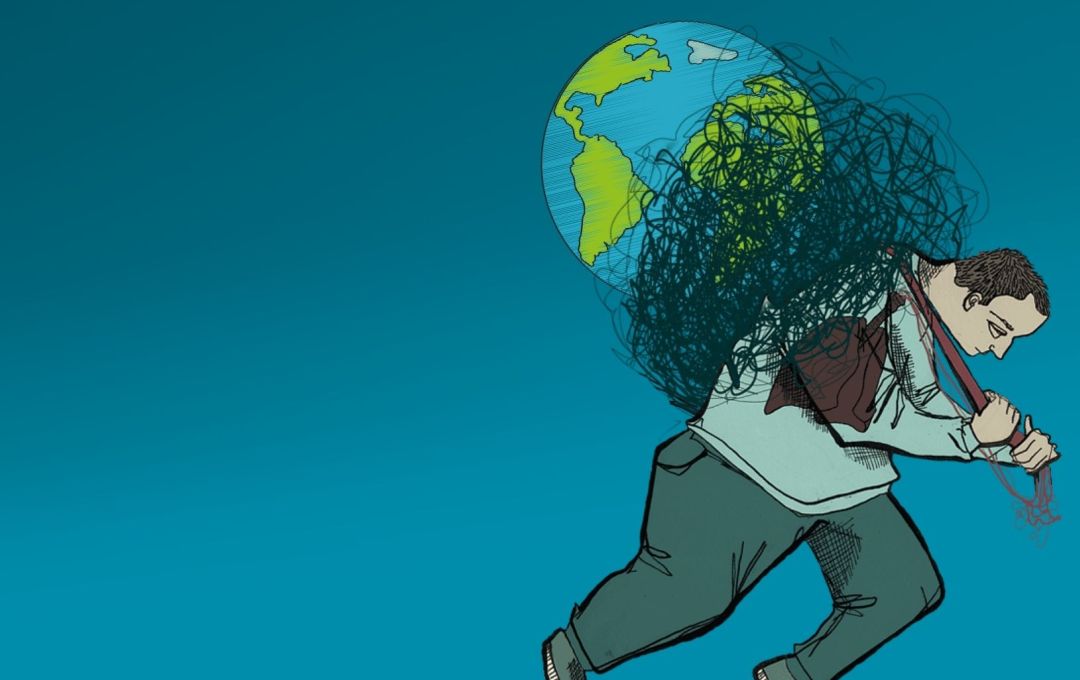SCCR to help tackle youth climate anxiety in the wake of COP26

Ongoing stress about the climate crisis, or 'eco-anxiety', is an increasing weight on many of us, especially young people. Like all stress, this anxiety can put added pressures on relationships and mental health. Cyrenians Scottish Centre for Conflict Resolution's upcoming ‘Anxious and Afraid’ events will help families manage conflicts growing out of anxiety and to help find strategies to manage anxiety productively.
The 2021 United Nations Climate Change Conference, also known as COP26, is the 26th United Nations Climate Change conference, continuing until Friday 12 November. As it is being held in Glasgow, COP26 has brought into focus many Scots' fears over the consequences of man-made climate change.
Perhaps no age group is so concerned by potential ecological disaster than young people - so much so, many are suffering from what experts call ‘eco-anxiety’, an ongoing fear of catastrophe based on modelling future outcomes for the environment. With more wild weather events predicted and the global climate future looking bleak, a recent survey found 31 percent of 18-34 year olds are ‘very’ or ‘extremely’ worried about climate change compared with 19 percent of over-65s.
Those who grew up in the 1970s and 1980s will perhaps find in these young people’s worries an echo of what they experienced as children, when an existential threat was posed by competing superpowers and the spectre of nuclear war. Whatever happens over the next few decades, young people’s fear is real and having clear impacts now.
Eco-anxiety is enough of a broad concern for young people in the 2020s that psychotherapists met in London this September to discuss approaches to managing it. Sarah Niblock of the UK Council for Psychotherapy (UKCP) said in her opening speech;
"Eco-anxiety is a term that’s used a lot, but it’s misguided if it’s not used in the right way. This is not an illness or disorder, it’s a perfectly normal and healthy reaction."
While there are ways in which we as individuals can take actions to protect the environment – household energy health checks; reducing how often you fly; defending and promoting local green spaces – many will continue to feel anxious, helpless or overwhelmed.
And that anxiety can affect our home lives. When we’re anxious, we experience stress. Stress in itself doesn’t necessarily cause tension but the behaviours that can come from feeling stressed – irritability, curtness, shouting – can lead to conflict within the family. If the cause of anxiety isn’t addressed, these conflicts can deepen over a period of time.
Young people can't single-handedly turn the tide of the climate crisis to address their fears, but they can learn to process and express anxiety in ways that are safe and healthy rather than overwhelming and self-destructive. Cyrenians Scottish Centre for Conflict Resolution’s focus is on conflict resolution, mediation and early intervention work with the ultimate aim of diminishing the number of young people experiencing homelessness after leaving the family home over unresolved disputes.
If you or a young person you know are feeling anxious about climate change, or for any other reason, Cyrenians Scottish Centre for Conflict Resolution has events and resources for young people and their parents and carers that can help manage anxiety and the resultant conflict.
This includes the free online workshop tailored for young people, ‘Anxious and Afraid,’ coming up on Tuesday, 7 December, 12pm,. The session will share ideas for how to resolve family conflicts that have arisen from feelings of anxiety. Those who attend the session will be able to relate to the emotional state of being anxious and afraid, while the session will explore some of the science behind this state as a way to begin to improve individual wellbeing. The session is free, online and last 40 minutes. If you’d like to reserve a ticket, click here.
SCCR is also holding a companion ‘Anxious and Afraid’ session for parents and carers on Tuesday, 23 November, also starting at noon. Tickets are available here.